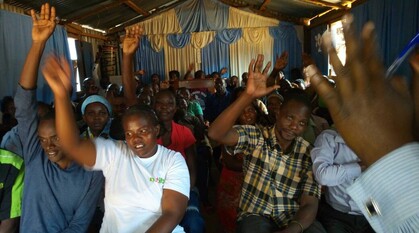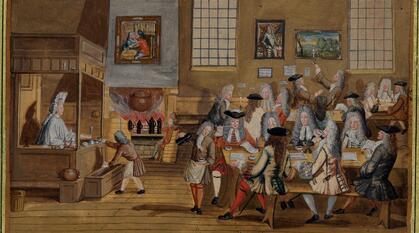Becoming an anti-racist faith community
As Black History Month draws to a close, Siobhán Haire shares how Quakers are taking action on becoming an anti-racist employer and faith community.

[QUOTE-START]
Tackling racism is a spiritual imperative…We may not be ready, we may not feel that we are ready, but this next step we take in faith and trust that the Spirit will show us what we need to do. We declare our commitment to becoming an actively anti-racist faith community. We are still wrestling with what this means for us.
- Minute 17, Yearly Meeting 2021
[QUOTE-END]
This year, the theme of Black History Month is 'Time for change: Action not words'. 14 months ago, at Yearly Meeting, Quakers in Britain committed to becoming an actively anti-racist faith community. What actions have those words pushed us to take since then?
Action as an employer
Britain Yearly Meeting has been working to become an anti-racist employer for some time. We began by working with external diversity experts to understand, amongst other things, how it felt to be an employee of colour working for Quakers in Britain.
The report which came from this process made for uncomfortable reading, describing painful experiences where we haven't lived up to our aspirations as inclusive employers. Colleagues shared experiences of micro-aggressions, and times when their concerns related to inclusion weren't taken seriously or dealt with consistently. As employers, we are committed to learning from this report, and taking steps to do better.
The consultants who led this audit process recommended that we provide an equity, diversity and inclusion learning programme for all staff, develop behaviour frameworks and create more robust processes for handling oppressive incidents. Alongside this, we are identifying where marginalised staff face barriers and will take actions to remove them or provide support.
In recent weeks our learning programme has begun to roll out, with colleagues working together in small cohorts. Our staff working group on EDI will soon launch an action plan to guide us through the coming years. So while there is plenty more work to be done as an employer, we are moving forwards.
Action as a faith community
As a faith community we have continued to develop our voice and our witness on racial equality. Much of this work is undertaken or co-ordinated by Edwina Peart, our Inclusion and Diversity Coordinator. Edwina's work has included working with Area Meetings and Central Committees to deepen their understanding of racial justice and equality, supporting work to decolonise our centrally-managed work, and participating in the Churches Together in Britain & Ireland's Racial Justice Advocacy Forum. Through this group, Quakers have been represented in conversations with the Metropolitan Police Service about the role churches might play in speaking out and seeking to build community confidence.
Alongside action planning and learning, there's also a strong sense that turning our faith-based commitment into a one-off project isn't going to solve all our problems. We need to build out an understanding of how our values feed into our behaviours, create spaces to learn, make mistakes and try again, and to watch and wait in loving expectation.
There is no external scale of anti-racism which we can measure ourselves against, no impact dashboard for the personal and corporate epiphanies which are required of us if we are truly to embody anti-racism and know ourselves to be anti-racist. We'll have moments of clarity and progress, where a new insight is given to us, but we'll have many more moments of trying our best and feeling unsure about whether it's contributing to progress.
Making reparation
One moment where, as a national community of Quakers, we did feel an opening, was our decision at Yearly Meeting 2022 to "consider deeply how the Society of Friends in Britain might make financial and other reparation for our part in the wrongs of the transatlantic slave trade". I know that Friends across the country are considering how that commitment might translate into their local context, and we are doing the same thing within the national organisation.
During this Black History Month, we welcomed Anthony Reddie, a professor from the Oxford Centre for Religion and Culture to speak at our all-staff meeting. Anthony is a participative educator and liberation theologian who specialises in undertaking action-research and participative observational work with predominantly poorer Black communities in the UK.
When he joined us, he shared his rich reflections on reparations and for me, one key point stood out: "True reparations are not about what you do unilaterally in response to guilt about the actions of enslavers, true reparation comes about as a result of conversation with those who have been the victims of slavery and ongoing colonialism." I hope we will use this insight wisely as we move forward in our discernment.


